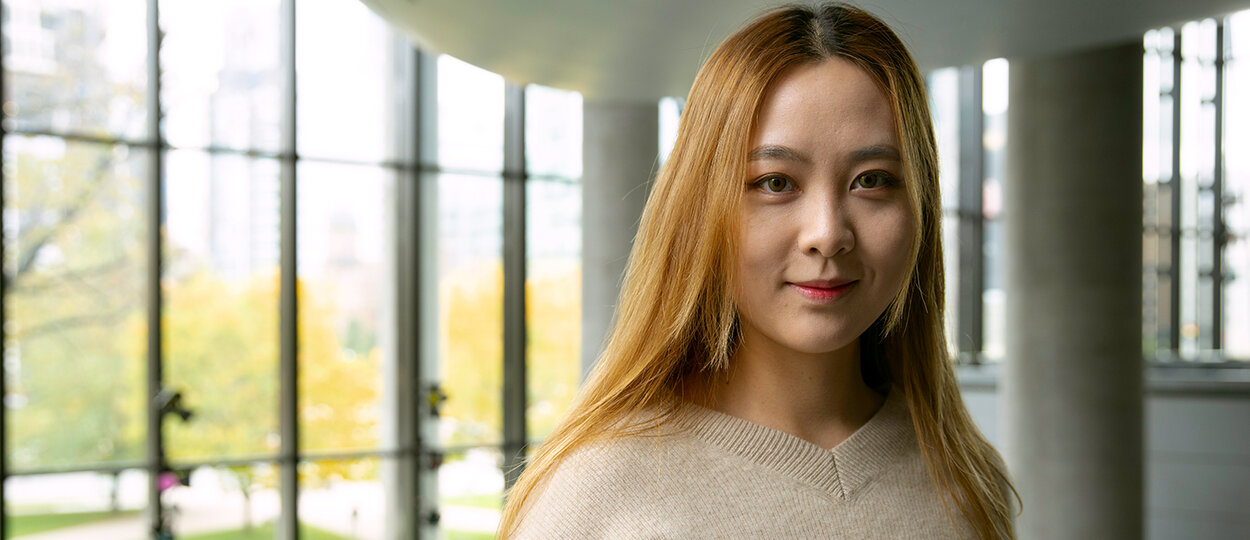What is your academic background and why is this area of research important?
I completed my BSc. in pharmacology and therapeutics at McGill University before joining the department of Pharmaceutical Sciences as a direct entry PhD student. Currently I am a third year PhD student under the supervision of Dr. Bendayan. My research focuses on the toxicity of antiretroviral drugs (ARVs) in the brain and its relevance to HIV-associated neurological complications.
In 2021, 38.4 million people globally were living with HIV, with 1.6 million people newly infected and 0.8 million deaths from AIDS-related illnesses. In the recent years, HIV infection has been rising, however, the fight against new infections has declined in many countries. It has been more than four decades since AIDS was first reported in 1981, however, to date, there is no effective vaccine or cure. Despite the implementation of combined antiretroviral therapy (cART), up to 50 per cent of patients develop mild or moderate HIV-associated neurological disorders (HAND), which significantly compromise their life quality. The investigation of the pathogenesis of HAND is challenging due to its complexity and the limitation of good animal models. We propose that the toxicity of first line antiretroviral drugs (ARVs) plays a critical role in HAND pathogenesis.
What led you to your current research group?
I developed my research interest in infectious disease and neurological disorders as a pharmacology student at McGill University. HIV research is extremely challenging due to the limitation of good animal models. Dr. Bendayan’s lab has implemented a small animal model of HAND in mice which has been very useful in the lab for the undertaking of various HIV-related research projects.
What are some of the challenges you had to overcome within your research?
The transition from undergraduate studies to doctoral work has been a big challenge for me. As a PhD student, the process of framing my research ideas from literature review and evaluating their feasibility was vastly different from my undergraduate experience where passive learning was mostly required. I really appreciate Dr. Bendayan and our lab research associate Hoques’ endless support and for helping me develop my own ideas and put them in action.
Learning of RNA extraction from freshly isolated capillaries obtained from C57BL/6 mice brain has been the biggest technical challenge that I have encountered. I spent three months with Hoque troubleshooting and optimizing the protocol. We were able to glean promising data in the end. Persistence is crucial for scientific research.
How do you see your current research playing a role in your career?
In July 2022, I had the honor to attend the 24th International AIDS Conference held in Montreal, a world prestigious HIV conference, supported with an award of full scholarship from the International AIDS Society (IAS). My abstract was selected for one of the ten late-breaker posters from Track A (Basic and Translational Science), and I presented my work throughout the 3 conference days with an opportunity to network, interact and discuss my research with many world-leading HIV scientists and professionals working in different disciplines. The experience from AIDS 2022 was priceless to me. HIV is becoming a forgotten epidemic, but the battle against HIV needs to be pursued and requires the support from all different disciplines, from molecular basic science to clinical and social. The research that I am doing keeps reminding me of the complexity of the disease and the urgent demands for better and safer therapies. I would like to continue HIV research in the future as a career and contribute my part in the long-lasting battle against HIV. In HIV research, every step counts. And I would like to take my own steps.
What do you like to do when you are not working on research?
Networking and academia-industry transition are often two big challenges for many graduate students who are interested in pursuing career in pharmaceutical industry. I am motivated to help them conquering such challenges. I am currently the Treasurer for the American Association of Pharmaceutical Sciences (AAPS) Student Chapter at the University of Toronto. I am involved in various activities such as Chapter renewal and finance tracking. I am also the current career seminar associate in The Life Sciences Career Development Society (LSCDS). I am responsible to recruit medical professionals from pharmaceutical companies as speakers in our seminar to address potential career options in industry. Bridging the gap between academia and industry is important. By participating in such associations, I am determined to help other students with the networking and enhance their awareness of post-graduation career options in the industry.
What is your favourite thing about life in Toronto?
I am an international student and I spent 18 years in mainland China before I started my 4-year journey at McGill University in Montreal. I would like to say I really love and enjoy the life in Toronto! Toronto is such a multicultural city with a great ethnic and cultural diversity, which gives me the opportunity to interact with people from diverse backgrounds. Meanwhile, this city is youthful and vibrant and full of life and excitement! I always love the sunset in the summer and the maple trees in the autumn!
More News
Image

Trade tariffs on pharmaceuticals ‘not the way to go’: U of T expert releases new study showing disruptions and cost increases
Trade tariffs on Canadian pharmaceuticals expected to increase costs in the U.S. and strain drug supply chains.
Read More
Image

Northern Ontario rotation inspires new perspective on pharmacy practice
Alina Montgomery’s rotation on Manitoulin Island demonstrated the importance of pharmacists in northern communities
Read More
Image

PharmaSEE mentor shares breadth of opportunities in pharmacy profession
With patient care and industry experience, Seann Seto shares perspectives and insights with PharmD students.
Read More
